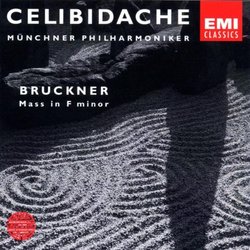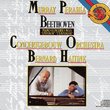| All Artists: Anton Bruckner, Sergiu Celibidache, Münchner Philharmoniker, Margaret Price, Doris Soffel, Peter Straka, Matthias Hölle, Philharmonischer Chor München Title: CELIBIDACHE / Münchner Philharmoniker - Bruckner: Mass No. 3 in F minor Members Wishing: 0 Total Copies: 0 Label: EMI Classics Original Release Date: 1/1/1990 Re-Release Date: 7/12/2005 Album Type: Import Genre: Classical Style: Opera & Classical Vocal Number of Discs: 1 SwapaCD Credits: 1 UPC: 724355670229 |
Search - Anton Bruckner, Sergiu Celibidache, Münchner Philharmoniker :: CELIBIDACHE / Münchner Philharmoniker - Bruckner: Mass No. 3 in F minor
 | Anton Bruckner, Sergiu Celibidache, Münchner Philharmoniker CELIBIDACHE / Münchner Philharmoniker - Bruckner: Mass No. 3 in F minor Genre: Classical
Romanian conductor Sergiu Celibidache's attitude toward recordings of music was the polar opposite of Glenn Gould's: he found them to be dangerous distortions that could never recapture the holistic experience of the live ... more » |
Larger Image |
CD DetailsSynopsis
Amazon.com Romanian conductor Sergiu Celibidache's attitude toward recordings of music was the polar opposite of Glenn Gould's: he found them to be dangerous distortions that could never recapture the holistic experience of the live concert hall. Since his death in 1996, Celibidache's heirs have nevertheless decided to combat the proliferation of dubious pirate discs with an authorized edition on EMI. This recording is from the series's second volume, which illustrates the conductor's particularly deep, lifelong affinity for the music of Anton Bruckner and draws from concerts he gave with the Munich Philharmonic in the '80s and '90s (one of the most probing and incandescent is Celibidache's account of the Ninth Symphony). Bruckner was once described as a "God-intoxicated man." His large-scale, symphonically rich Mass in F Minor (first performed in 1872 and later revised several times) is a statement of faith that is at once humble and resonant with the assurance of inner peace. Celibidache's broad tempi allow the music to build from within and show a command of the special breath that is unique to Bruckner. The result often seems to step outside the ordinary experience of time, with a sense of spaciousness that conveys both the austerity and mystery of a Romanesque basilica. Grandly massed passages of fugal momentum are shaped with a granitic beauty, while the ecstatic figurations of the Et incarnatus est (its solo violin and viola accompaniment reminiscent of the Benedictus from Beethoven's Missa Solemnis) seem to float like incense. Even in the most sonorous climaxes, Celibidache maintains a sensitive transparency of choral and orchestral textures. Whatever the current vogue for New Age "spiritual" music, this inspired performance confirms how truly transporting Bruckner's aesthetic vision remains. --Thomas May Similarly Requested CDs
|
CD ReviewsA stunning performance Richard A. Cavalla | NJ, USA | 03/14/2000 (5 out of 5 stars) "Bruckner's Mass in f, like nearly all of his music, goes beyond being spiritual in the broadest sense, to literally reaching for infinity. This performance by Sergiu Celibidache and the Munich Philharmonic comes as close to scaling the heights of the infinite as any performance I have ever heard. From the very beginning, Celi's broad phrases and resplendent sonorities bring an almost unimaginable purity and beauty to the work. At 77 minutes, it seems Celi should have stretched this piece to the breaking point, but instead time seems to stand still and we are left with a performance that I wish would never end. Highest recommendations." An amazing performance Brucknerian2006 | 03/08/2000 (5 out of 5 stars) "Forget Jochum and buy this cd. By far the most spiritual performance i've ever heard." Celibidache At His Most Inspired Jeffrey Lipscomb | Sacramento, CA United States | 06/12/2005 (5 out of 5 stars) "I have owned nearly a dozen recordings of Bruckner's 3rd Mass over the years, but Celibidache's interpretation really stands out from the rest. Unlike Celibidache's mostly very slow Bruckner symphony recordings, the tempos here are fairly conventional. This reading has some of the most beautifully spiritual playing I have ever heard in ANY choral work on disc. The audience is reasonably quiet, and EMI's sonics are warm and immediate.
But, to complicate matters, there is more than one Celibidache "live" recording of the Mass #3. This EMI CD captures a performance of 6 March 1990. There was also a reading from 13 September 1990 on Exclusive CD EX92T37/38, which has a different bass (EMI's Matthias Holle was replaced by Hans Sotin). The performances are very similar (there is a bit more audience coughing on Exclusive, which is likely why EMI chose the quieter March reading; the orchestral sound is pretty much identical in both). That 2-CD set also contains amazing accounts of Hindemith's "Mathis der Maler" Symphony (Munich Phil. 1981) and the Overture to Weber's "Oberon" (Stuttgart 1982). I warmly recommend this EMI version of Celibidache's uniquely reverent Bruckner Mass. It clearly surpasses every version I have heard from other forces (e.g., Jochum on DG, though Maria Stader's soprano is very beautiful, Karl Forster's on LP, etc.). I still keep the work's first recording on a Vox LP conducted by Ferdinand Grossman, but it is Celibidache that I reach for more often. If you can find the Exclusive CD set, it offers an equally spiritual reading, plus some astonishing examples of Celibidache's way with Hindemith & Weber. And a perfect complement to this Mass is the fine film by Jan-Schmidt Garre called "Sergiu Celibidache and Bruckner's Mass in F Minor: In Rehearsal." That is available on an ArtHaus DVD, and it provides a fascinating glimpse at how the Romanian maestro built the foundation for this magnificent interpretation. Highest recommendation. Jeff Lipscomb" |

 Track Listings (6) - Disc #1
Track Listings (6) - Disc #1








